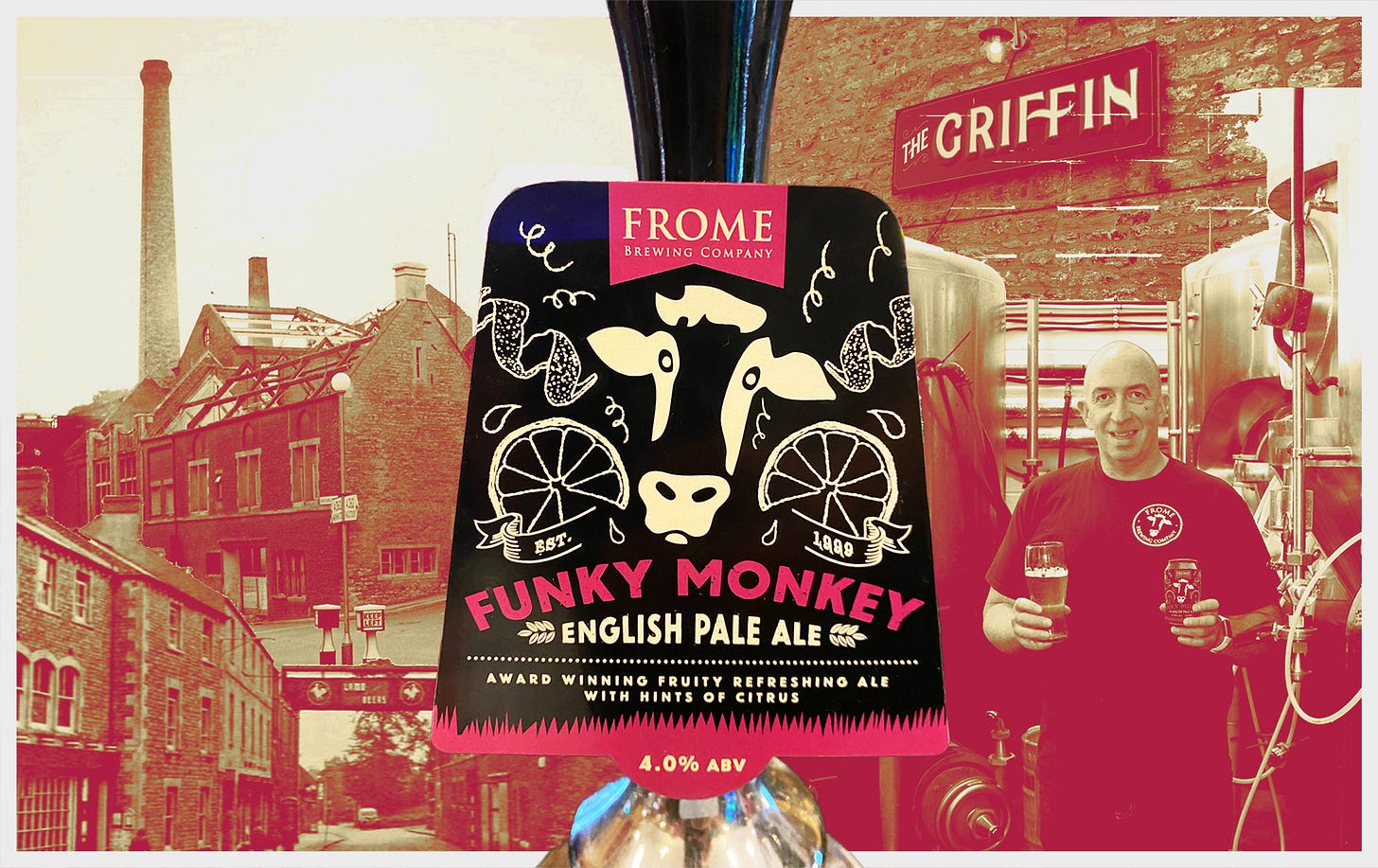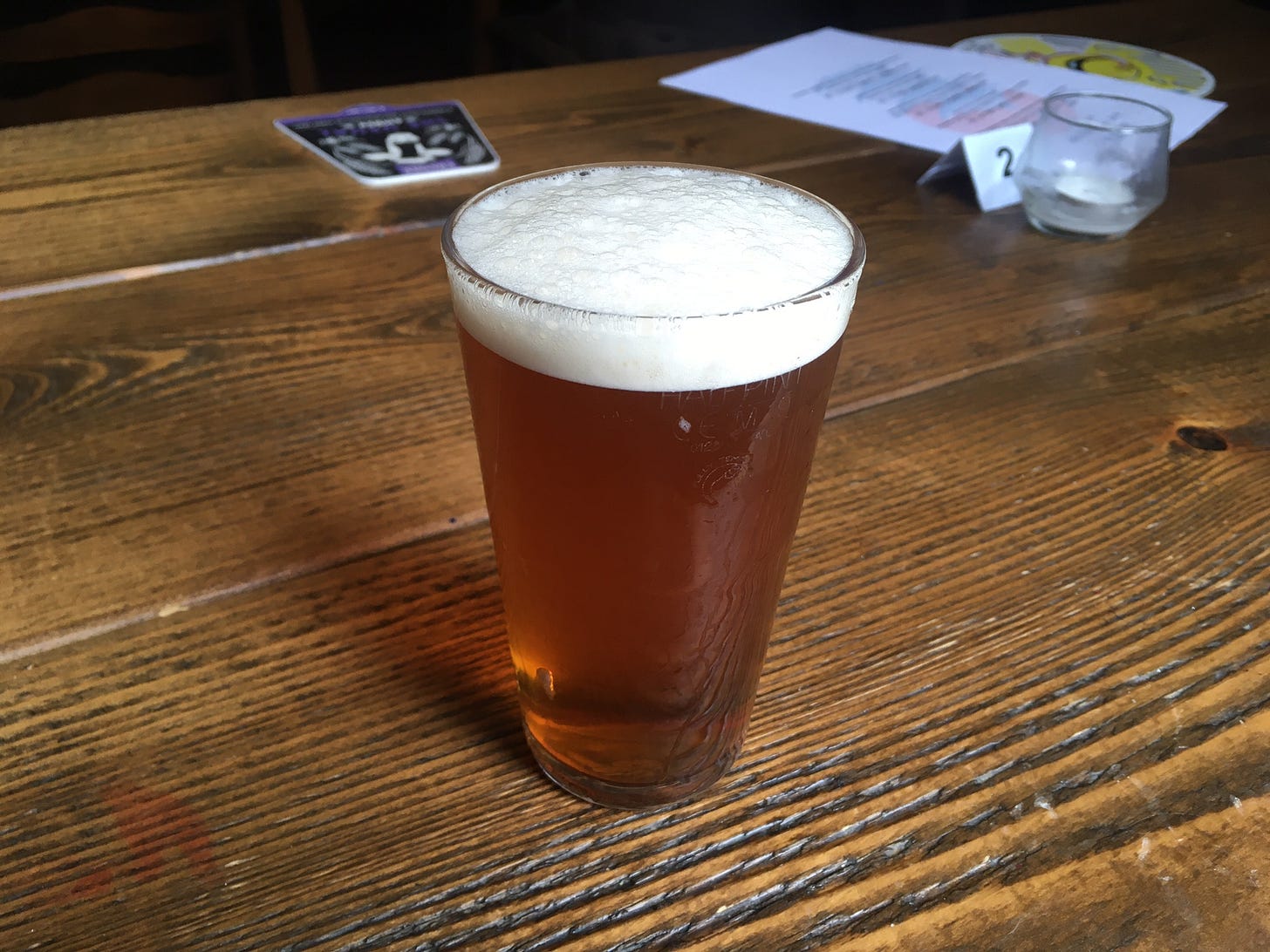A Frome pub icon [WFJ #77]
Examining what has become the most recognised piece to the town’s drinking culture
Welcome back to The WFJ’s series on Frome’s hero dishes and drinks. So far we’ve sampled Hesperian’s scampi fries (RIP), Lo Rapitenc’s escalivada, HydeAway’s negroni, Hamper’s reuben, and Het’s beef rendang.
Now – given last week’s newsletter on the boons of cask-dispensed beer – is an apt time to elaborate on an item even more inherent to Frome culture.
In case you needed another reason to believe Frome is a bit of an alien to the county in which it resides, just look at what it drinks. Because the town’s most iconic beverage – made by a local and drunk by locals – is not, actually, a cider.
Rather, it’s a 4.0% cask conditioned pale ale. Perhaps this is apt, given Frome has a much richer brewing heritage (Lamb Brewery, for instance, had a presence in town for much of the 19th and 20th centuries) than it does towards anything cider.1 Circumstances dictate a beer is what we’ve got and, thanks to those who make it, it ain’t bad either.
“When I first started brewing it in 2000,” Frome Brewing Company’s Rik Lyall tells The WFJ, “it was called Hedge Monkey, which is a generic term for a hippy. But it quickly changed to ‘Funky Monkey’ within the first month of it being on the bar in The Griffin (which, since May, Rik is back to running), because that’s what drinkers thought it should be.”
In the two decades since, Funky Monkey has become a common sight on pub bar tops in Frome. Its longevity speaks for itself, though if I was to guess further into why Funky has earned such a status, maybe it’s because it sits in that small but cosy niche between new beer and old beer. Yes, Funky Monkey relies on American Amarillo and Centennial hops (Centennial is, albeit, partly from English hop parentage), but on a backbone of traditional crystal and pale ale malt (via the legendary Warminster Maltings), a house-cultured yeast, and the long-established though unfortunately waning method of cask conditioning.
“It’s quite a simple recipe,” Rik says. “The flavour comes from the interaction between the crystal malt and the fruitiness of the hops. The body of the beer comes from the ingredients, but the flavours from the yeast is what gives it its soul.”
Because of the nature in which it is best served – via cask hand-pulled dispense in the pub – the flavours you get from one pint of Funky Monkey to the next are generally similar, but also subtly changeable. My most recent encounter with it, for example, involved an orange, fudgey aroma with mellow flavours of blood orange. Others have described Funky Monkey as akin to ‘jam’, ‘mango’, and ‘pineapple’ and with aromas of ‘toffee’, but due to the living nature of cask beer, my or your assessment of the same pint at the next pub may well align with none of the above descriptions.
As mentioned in last week’s newsletter, that’s part of the beauty of cask beer, or what some still call ‘real ale’. While Frome Brewing also stick Funky Monkey in a can for drinkers to enjoy at home or on a picnic, as Rik alludes, the experience is never going to be the same as having it fresh from the tap. “Cans,” he says, “people want to put in the fridge. A beer at 5°C tastes completely different to a beer at 14°C or 15°C.”
This helps explain why Funky Monkey and other cask beers are served at cellar temperature (or what some drinkers jokingly or naively describe as ‘warm’). Flavours generated while maturing in the cask are so nuanced, that, when the beer’s served cold, they’re impossible for the drinker to detect. So, if you’re served a pint of Funky Monkey that’s cold to the touch, you’re not really getting the right experience.
As a result of all this, the quality of cask beer – generally unlike kegged beer – is as dependent on the pub serving it as it is the brewer brewing it. Only a handful of pubs in Frome, including The Griffin (where Frome Brewing originated – the brewery’s cow head logo a nod to Milk Street where the pub’s situated), The Ship, and Just Ales, serve a pint of cask well, whether it’s Funky Monkey or not. Just Ales, run by Andy Legrange, perhaps foremost. “Andy does a cracking job,” says Rik. “He keeps a great pint.”
As you’ve probably noticed, Funky Monkey is one of several Frome Brewing Co’s beers. But its influence within the brewery can’t be understated – there’s a reason why Hazy Daisy, though very different in taste and appearance, is also a 4% pale ale. “Hazy Daisy developed because I started putting Funky Monkey into cans,” Rik says, “and I realised I needed something more punchy. So instead of calling it Funky Monkey, we developed a bolder version of it, but a bit paler to let the hops shine through.”
From a certain distance, it’s a little bit strange that this small Somerset town’s most recognised pint is a sessionable beer. Then again, Funky Monkey’s sphere of influence now extends far beyond its postcode, with plenty of sightings in pubs in Bury, Rochdale, and Nottinghamshire.
Since it’s putting the town on the map for many people nowhere near it, and earning its status as the default for many local drinkers, maybe it’s time Frome recognised Funky Monkey as an intrinsic part of the town’s composition. Beyond, that is, our collective subconscious.
A story for another time, I think




